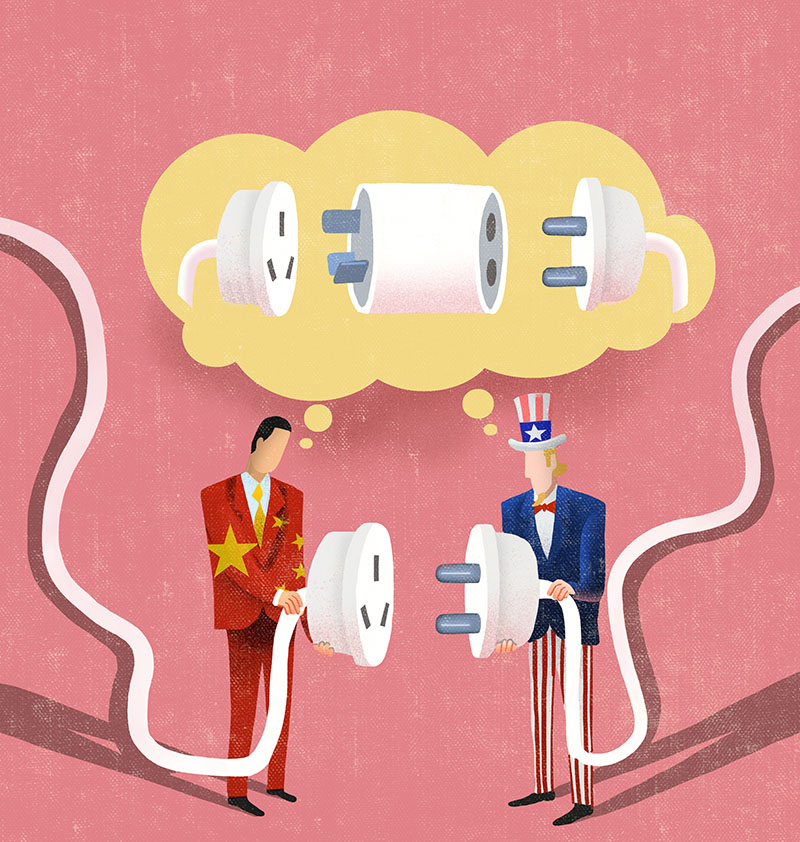
As tensions between the U.S. and China continue to mount, there is growing sentiment in both countries that cooperation may no longer be possible. For example, the U.S. National Security Strategy, released at the end of 2017, seems to be based on that belief.
In China, senior government officials have gone to great lengths to express strong support for cooperation with the U.S., as exemplified by remarks by State Councilor and Foreign Minister Wang Yi at a recent think tank dialogue.
There is, however, also growing skepticism among the Chinese intelligentsia, media and general public about the pursuit of collaboration against mounting American suppression. Efforts to shape public perceptions in both countries seem to follow a hidden “not to do” logic: China wants the U.S. not to be hostile to China or block its rise; the U.S. wants China not to disrupt the international order led by America or challenge its leadership.
Meanwhile, there has been too little positive discussion about what type of country one would like the other to be. For China, thinking differently about the U.S. might be helpful.
First, the aforementioned discontent and skepticism in China are perfectly understandable, but a premature negative conclusion about the U.S. must be avoided. From the Chinese perspective, in the 40 years of reform and opening-up, it has been actively joining the international order dominated by the U.S. and made considerable contributions to it, yet in the end the U.S. remains hostile, which naturally disappoints China.
Nonetheless, it is important not to let feelings of discontent obscure China’s innovative successes. Its accession to the WTO, for example, came at a cost and with huge determination despite high-profile voices in the country questioning the unfair and unreasonable U.S.-led economic order.
In a sense, behind the Chinese determination and efforts in joining the WTO was a major intellectual revolution: It had insisted on changing the unjust and unreasonable international order before becoming a part of the international system, but now it began to believe in joining the world system first and reforming from within as integration deepened.
As developments thereafter have demonstrated, the intellectual revolution has not only enabled China to develop at high speed but also pushed the international order toward being more balanced and just.
Now that confrontational elements in U.S. policy toward China have visibly increased, China faces a similar situation. Should we pursue dialogue and cooperation with the U.S. only after it first abandons its hostile moves and the perception of China as an enemy? Or is there still room for dialogue and cooperation and possibilities for changes and improvements as we go?
It must be pointed out that there is not yet a full consensus in the U.S. for a new cold war with China, and a premature conclusive judgment will render cognitive flexibility impossible.
Second, the type of America China would like should be an important part of the discourse. China can apply innovative thinking and construct the framework. In 2005, former U.S. Secretary of State Robert Zoellick identified China as a “responsible stakeholder,” which set new expectations for China to shoulder more international responsibility in the U.S.-dominated international order and use that as a yardstick for judging China. It’s been 15 years since then. Probably China should consider including in its discourse with the U.S. an explicit description of its expectations about the U.S. and measuring the international conduct of the U.S. against those expectations.
On one hand, this will help avoid the type of defensive discourse in which China urges the U.S. not to do something and criticizes U.S. hegemony and power politics. On the other, this approach may be easier to accept around the world, even in the United States.
China-U.S. relations today involve not only the respective governments but also the private sector, civil society and others. In the fight against the COVID-19 pandemic, for example, the Bill & Melinda Gates Foundation has played an important role in both countries. The foundation is also the second-largest contributor to the World Health Organization after the U.S. government. It is thus an important potential element in China-U.S. cooperation on multilateral platforms. These positive factors in American society should be reflected in China’s innovative discourse system with the U.S.
Third, the topic should be framed in ongoing dialogues and cooperation with other countries, as well as with regional and international organizations. The type of America we want is a challenge not only for China but also for the rest of the world.
Despite the current difficulties in China-U.S. relations, it is important to note that the U.S. has played an important leading role in the construction of the postwar international system. The United Nations, World Bank, International Monetary Fund, World Trade Organization and other multilateral international mechanisms have been designed and developed under U.S. leadership, proving that the U.S. is a very creative and broadminded country.
These mechanisms continue to constitute the basic framework of international relations today. Without the U.S., the world’s sole superpower and the founder of today’s international system, the construction and discussion of any new international order will not be possible or successful. The international community, China included, still hopes to bring the U.S. back to multilateralism rather than seeking a U.S.-free new order.
While affirming the historical contribution of the U.S., China and the rest of the international community have a shared task to guide the U.S. to gradually adapt to the new situation and readjust its self-perception and its understanding of international relations. This will be a new test for Chinese diplomacy.
